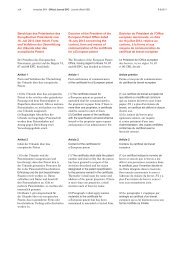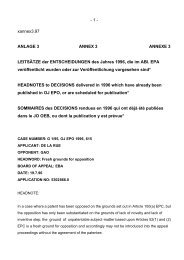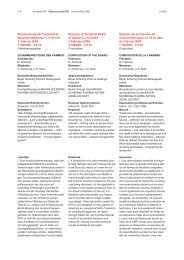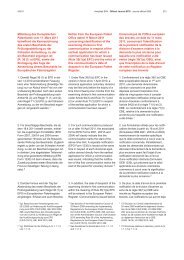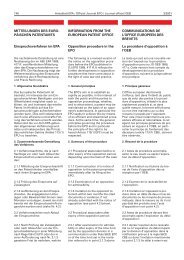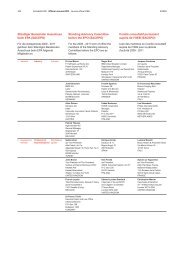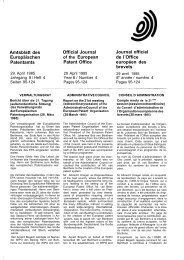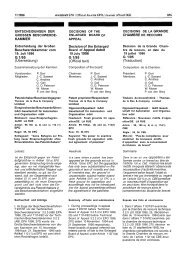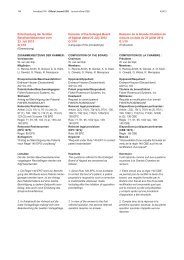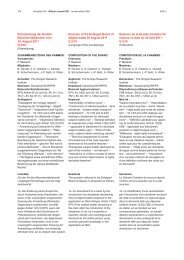Sonderausgabe 1 - European Patent Office
Sonderausgabe 1 - European Patent Office
Sonderausgabe 1 - European Patent Office
Create successful ePaper yourself
Turn your PDF publications into a flip-book with our unique Google optimized e-Paper software.
86<br />
<strong>Sonderausgabe</strong> Nr. 1 ABl. EPA / Special edition No. 1 OJ EPO / Edition spéciale n° 1 JO OEB<br />
(4) Das Recht eines ehemaligen<br />
Vertragsstaats, ein europäisches <strong>Patent</strong><br />
nach der Fassung des Übereinkommens<br />
zu behandeln, die auf ihn anzuwenden<br />
war, wird durch diesen Artikel nicht<br />
berührt.<br />
Artikel 176<br />
Finanzielle Rechte und Pflichten eines<br />
ausgeschiedenen Vertragsstaats<br />
(1) Jeder Staat, der nach Artikel 172<br />
Absatz 4 oder Artikel 174 nicht mehr<br />
dem Übereinkommen angehört, erhält<br />
die von ihm nach Artikel 40 Absatz 2<br />
geleisteten besonderen Finanzbeiträge<br />
von der Organisation erst zu dem Zeitpunkt<br />
und den Bedingungen zurück, zu<br />
denen die Organisation besondere<br />
Finanzbeiträge, die im gleichen Haushaltsjahr<br />
von anderen Staaten gezahlt<br />
worden sind, zurückzahlt.<br />
(2) Der in Absatz 1 bezeichnete Staat<br />
hat den in Artikel 39 genannten Anteil an<br />
den Jahresgebühren für die in diesem<br />
Staat aufrechterhaltenen europäischen<br />
<strong>Patent</strong>e auch in der Höhe weiterzuzahlen,<br />
die zu dem Zeitpunkt maßgebend<br />
war, zu dem er aufgehört hat,<br />
Vertragspartei zu sein.<br />
Artikel 177<br />
Sprachen des Übereinkommens<br />
(1) Dieses Übereinkommen ist in einer<br />
Urschrift in deutscher, englischer und<br />
französischer Sprache abgefasst, wobei<br />
jeder Wortlaut gleichermaßen verbindlich<br />
ist, und wird im Archiv der Regierung der<br />
Bundesrepublik Deutschland hinterlegt.<br />
(2) Fassungen des Übereinkommens in<br />
anderen als den in Absatz 1 genannten<br />
Amtssprachen von Vertragsstaaten, die<br />
der Verwaltungsrat genehmigt hat,<br />
gelten als amtliche Fassungen. Bei<br />
Meinungsverschiedenheiten über die<br />
Auslegung der verschiedenen<br />
Fassungen sind die in Absatz 1<br />
genannten Fassungen maßgebend.<br />
(4) Nothing in this Article shall affect the<br />
right of any State that has ceased to be<br />
a party to this Convention to treat any<br />
<strong>European</strong> patent in accordance with the<br />
text to which it was a party.<br />
Article 176<br />
Financial rights and obligations of former<br />
Contracting States<br />
(1) Any State which has ceased to be a<br />
party to this Convention in accordance<br />
with Article 172, paragraph 4, or Article<br />
174, shall have the special financial<br />
contributions which it has paid pursuant<br />
to Article 40, paragraph 2, refunded to it<br />
by the Organisation only at the time<br />
when and under the conditions whereby<br />
the Organisation refunds special financial<br />
contributions paid by other States<br />
during the same accounting period.<br />
(2) The State referred to in paragraph 1<br />
shall, even after ceasing to be a party to<br />
this Convention, continue to pay the<br />
proportion pursuant to Article 39 of<br />
renewal fees in respect of <strong>European</strong><br />
patents remaining in force in that State,<br />
at the rate current on the date on which<br />
it ceased to be a party.<br />
Article 177<br />
Languages of the Convention<br />
(1) This Convention, drawn up in a single<br />
original, in the English, French and<br />
German languages, shall be deposited<br />
in the archives of the Government of the<br />
Federal Republic of Germany, the three<br />
texts being equally authentic.<br />
(2) The texts of this Convention drawn<br />
up in official languages of Contracting<br />
States other than those specified in<br />
paragraph 1 shall, if they have been<br />
approved by the Administrative Council,<br />
be considered as official texts. In the<br />
event of disagreement on the interpretation<br />
of the various texts, the texts<br />
referred to in paragraph 1 shall be<br />
authentic.<br />
2007<br />
(4) Le présent article ne porte pas<br />
atteinte au droit d’un Etat qui a cessé<br />
d’être partie à la présente convention<br />
d’appliquer aux brevets européens les<br />
dispositions du texte de la convention à<br />
laquelle il était partie.<br />
Article 176<br />
Droits et obligations en matière financière<br />
d’un Etat contractant ayant cessé<br />
d’être partie à la convention<br />
(1) Tout Etat qui a cessé d’être partie à<br />
la présente convention en application de<br />
l’article 172, paragraphe 4, ou de l’article<br />
174 n’est remboursé par l’Organisation<br />
des contributions financières exceptionnelles<br />
qu’il a versées au titre de l’article<br />
40, paragraphe 2, qu’à ladateetdans<br />
les conditions où l’Organisation<br />
rembourse les contributions financières<br />
exceptionnelles qui lui ont été versées<br />
par d’autres Etats au cours du même<br />
exercice budgétaire.<br />
(2) Les sommes dont le montant correspond<br />
au pourcentage des taxes perçues<br />
pour le maintien en vigueur des brevets<br />
européens dans l’Etat visé au paragraphe<br />
1, telles qu’elles sont définies à<br />
l’article 39, sont dues par cet Etat, alors<br />
même qu’il a cessé d’être partie à la<br />
présente convention ; le montant de ces<br />
sommes est celui qui devait être versé<br />
par l’Etat en cause à la date à laquelle il<br />
a cessé d’être partie à la présente<br />
convention.<br />
Article 177<br />
Langues de la convention<br />
(1) La présente convention est rédigée<br />
en un exemplaire en langues allemande,<br />
anglaise et française, qui est déposé<br />
aux archives du gouvernement de la<br />
République fédérale d’Allemagne, les<br />
trois textes faisant également foi.<br />
(2) Les textes de la présente convention<br />
établis dans des langues officielles des<br />
Etats contractants autres que celles<br />
visées au paragraphe 1 et agréés par le<br />
Conseil d’administration sont considérés<br />
comme textes officiels. En cas de<br />
contestation sur l’interprétation des<br />
divers textes, les textes visés au paragraphe<br />
1 font foi.



